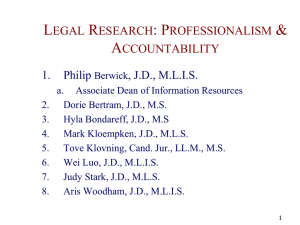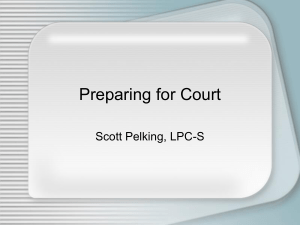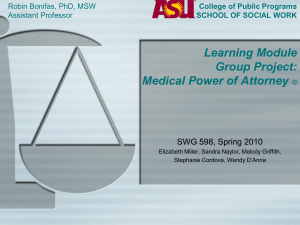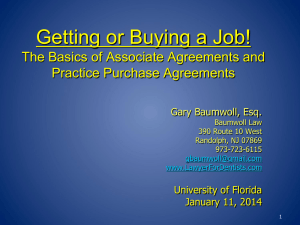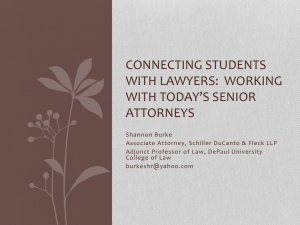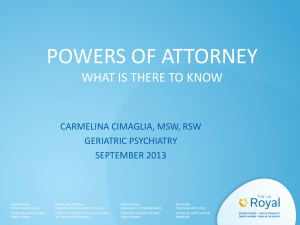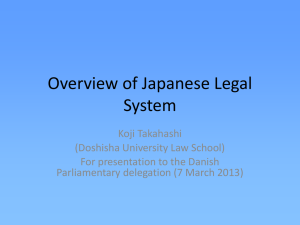Wills and Powers of Attorney Presentation
advertisement
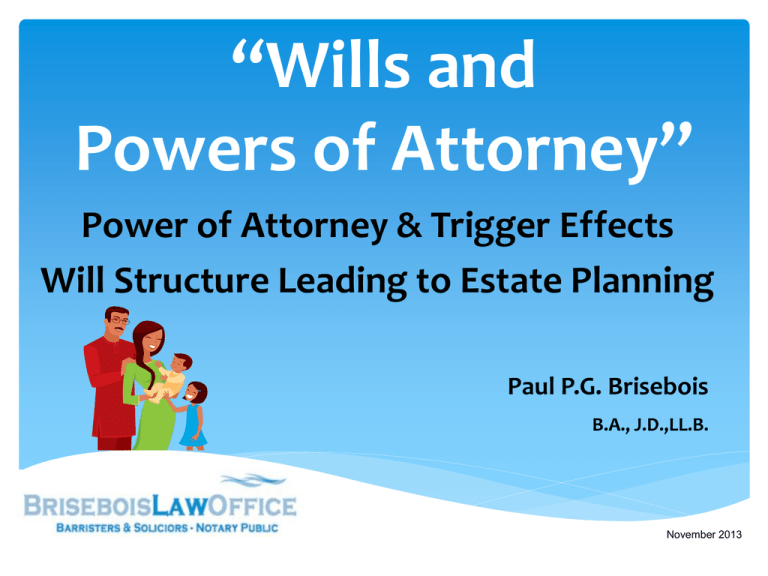
“Wills and Powers of Attorney” Power of Attorney & Trigger Effects Will Structure Leading to Estate Planning Paul P.G. Brisebois B.A., J.D.,LL.B. November 2013 Part 1 Power of Attorney • No automatic legal right for your family to handle your personal health and property affairs in the event of incapability. • By signing a Power of Attorney while you are capable, you will be able to have your own choice as to an attorney to act on your behalf. Power of Attorney continued… • Without a Power of Attorney in place at the time of incapacity, the process of installing a substitute decisionmaker is time consuming and costly. You either have to receive a Court appointment or apply through the Office of the Public Guardian and Trustee. Moreover, the identity of the person ultimately placed in that role cannot be known in advance. Power of Attorney continued… Form & Execution: Powers of Attorney require execution by the grantor/donor in the presence of 2 witnesses, each of whom must sign the document as witnesses. Certain persons are disqualified as witnesses: The attorney or the attorney’s spouse or common-law partner; The grantor/donor’s spouse or common-law partner, or their child; A person who is under guardianship; and A person under 18 years of age. Types of Powers of Attorney a) Continuing Power of Attorney for Property (Assets) b) Power of Attorney for Personal Care (Medical) (a) Continuing Power of Attorney for Property Scope of Authority: Subsection 7(2) of the Substitute Decisions Act specifically provides that a grantor may authorize the attorney under a Continuing Power of Attorney to do anything in respect of property that the grantor, if capable, could do, EXCEPT make or amend a Will for the grantor. Could include temporary authorization as a matter of convenience (i.e. selling/buying Real Estate). The grantor may, however, limit this scope by express provisions (i.e. managing a business/account). (a) Continuing Power of Attorney for Property continued.. Issues of Capacity: Section 8 of the Substitute Decisions Act sets out the conditions for a grantor to be capable of giving a Power of Attorney: Knows what kind of property is owned and approx. value; Is aware of obligations owed to dependents; Knows that the attorney will be able to act on their behalf and that they must account for their dealings; Appreciates that unless the attorney manages the property prudently, its value may decline; and Appreciates the possibility that the attorney could misuse authority. (a) Continuing Power of Attorney for Property continued.. Standard of Care and Accounting Responsibilities A fiduciary relationship exists between the grantor and attorney. The attorney has a duty to account to the grantor, if grantor is incapable. The personal comfort and well-being of the grantor are also to be considered in making decision. (a) Continuing Power of Attorney for Property continued.. Will Contents: Actions of the Attorney may indirectly affect the Will. The Attorney, therefore, has an obligation to find and read the grantor’s Will. This is to ensure that, as much as possible, the attorney does not inadvertently liquidate assets specifically given in the Will or destroy the grantor’s estate plan. (b) Power of Attorney for Personal Care Permits you to name someone to make decisions about your health care when you can not. Appoints a person(s) to make decisions for the donor respecting the donor’s “personal care” Includes: health care, nutrition, shelter, clothing, hygiene and safety. Can not force treatment unless the individual is in a “coma,” is “delusional” or provides “consent”. Living Will Clause: you may include various instructions for medical treatment you do and do not want. For example, the no “Heroic Measures” or “Pull the Plug” instructions. (b) Power of Attorney for Personal Care continued… Companion Statute: the Health Care Consent Act (HCCA) If there is no Power of Attorney for Personal Care, the Act sets out the hierarchy of substitute decision-makers who can give or withhold consent to a “treatment”. vs. An attorney appointed under a Power of Attorney for Personal Care will place the attorney ahead of relatives (subject to conditions and restrictions). (b) Power of Attorney for Personal Care continued… Issues of Capacity: Expressly set out in the Substitute Decisions Act that in order to be capable of giving a Power of Attorney for Personal Care, the donor must: Have the ability to understand whether the proposed attorney has a genuine concern for the person’s welfare; and Appreciates that the person may need to have the proposed attorney make decisions for that person. (b) Power of Attorney for Personal Care continued… Standard of Care and Record-Keeping An attorney for personal care is required to act diligently and in good faith. They are to explain to the incapable person the attorney’s powers and duties. Records to be kept are prescribed by regulation, for example: A list of all decisions regarding health care, safety and shelter, the reason for the decision and date. A copy of medical reports or other documents relating to decision. Triggering Events v.s. Incapacity With respect to both types of Power of Attorneys : Triggering Events may be included within the document. Triggering Events could include: time of signing of Power of Attorney, specified date, specific event (death of spouse) and choosing own qualified assessor. If not included, you must follow the Substitute Decisions Act, which sets out a mechanism that involves an assessment of the grantor by an assessor (a person accredited by the province to conduct assessments of capacity) or the issuance of a certificate of incapacity in respect of the donor under the Mental Health Act. Choosing your Attorney Choosing your Continuing Power of Attorney for Property: * Select someone you trust completely. * This person must be able to make good financial decisions on your behalf. * They will have the same authority to deal with your money and property as you do. * You should also consider naming an alternate attorney in case your first choice is unable or unwilling to act. Choosing your Attorney continued… Choosing your Continuing Power of Attorney for Personal Care: * Important that the person making medical decisions for you has a clear understanding as to your wishes. * Certain individuals are prohibited from acting as attorney for personal care, must be a spouse, partner or relative. * Someone with a “casual connection” to the donor. * If no Power of Attorney for Personal Care exists, must apply to the Court for appointment (not covered by Public Guardian and Trustee). Choosing your Attorney continued… * With respect to both types of Power of Attorneys, you should also consider naming an alternate attorney in case your first choice is unable or unwilling to act. * You may appoint more than one person to act together jointly or severally (pros and cons). * Appointing Powers of Attorney is not a black and white issue. Please take some careful consideration in naming a person(s) to act on your behalf. This should be someone whom you feel will make the proper decisions on your behalf whether those decisions deal with your property or your health. Part 2 Will Planning, drafting & execution Formal Wills: Must be signed at its physical end by the testator and by at least 2 witnesses. Some practices initial the bottom of each page of the Will. You must have all 3 of the signing parties present in the room at the same time while each of them signs. Neither witness can be a beneficiary due to “undue influence” concerns. Exceptions do exist by Court order. An affidavit of execution from one of the witnesses will avoid the problem and added costs in the event that, at the time the Will is submitted for Probate, each of the witness maybe deceased, mentally incapacitated or cannot be found. Holograph Wills: In Ontario, one can make a valid Will entirely in one’s own handwriting, with the signature of the testator at the physical end of the document. This requires no witnesses or other formalities of execution. Rarely advisable, however, this can sometimes be useful in emergency situations. May be problematic as claims of Incapacity or Undue Influence may arise. Will Storage: Potential problem that may arise when, at the time of the testator’s death, the original Will that was last in their possession cannot be found. In this situation, the law will presume that the individual has destroyed the Will. Where the testator wishes to have the lawyer retain the original Will and the lawyer is prepared to do so, the lawyer should ensure it is stored in appropriate facilities. Statutory Constraints on Testamentary Freedom a) Dependent Support Claims under the Succession Law Reform Act: Minors; b) Matrimonial Property Claims under the Family Law Act: Death is Like Divorce; and c) Equitable Claims of Unjust Enrichment: Common Law Spouses. Duties of Estate Trustees The Estate Trustee has a clearly defined role to settle the Estate timely and effectively, in addition to: Attending to the funeral and burial arrangements (subject to the intention of the testator and legal prohibitions); Proving the Will (if required) is obtaining a Certificate of Appointment (Probate); Collecting and protecting estate assets; Distributing the residue of the estate subject to the terms and conditions of the Will); Assemble and inventory Estate assets; Notify estate creditors, handle claims against the Estate and pay expenses. Administrative Provisions There are a number of administrative powers that are desirable to include, as they will facilitate administration of the estate, including: To sell, call in and convert (Real Estate); Pay debts and settle claims; Delegate investment discretion; Deal with a minor’s share of estate; Deal with interests in companies and other business and partnership interests; Administrative Provisions continued… Deal with notes and guarantees (banking); Distribute estate in specie (divide assets between beneficiaries without first converting them to cash); Lending and borrowing against the assets of the Estate; Make income tax elections. The Importance of Choosing the Right Executor Choosing an Executor only should be done after careful consideration. It is more than choosing someone honest. Should be someone you trust and who gets along with your family, if possible. Should have enough time to devote to the job. Lack of experience and expertise can be very costly. Types of Executors A trusted friend or family member; usually your spouse A professional, such as a lawyer or an accountant A corporate executor, usually a trust company Five Questions to consider when choosing an Executor: 1. Are you sure the Executor will be there when needed and able to devote enough time to the job? 2. Is the person comfortable in dealing with the legal, tax, investment, real estate, and business management aspects of being an Executor? 3. Can your Executor stay completely impartial and handle the emotional stress that could arise? 4. Have you asked, and has the person agreed to take on the responsibility? 5. Does the person you’ve chosen understand that he or she can be held personally liable for any mistakes? Other Considerations Guardianship of minors vs. Financial Guardianship Henson Trusts Mirror Wills and subsequent changes to the Will Primary and Secondary Wills Thank You for your time BRISEBOIS LAW OFFICE Barristers & Solicitors 2475 Central Avenue, Suite 101 Windsor, Ontario, N8W 4J4 www.briseboislawoffice.com Telephone: 519-974-5884 Fax: 519-974-1163 Email: inquiries@briseboislawoffice.com “Like” Us on Facebook “Brisebois Law Office” & #Follow us on Twitter @briseboislaw

